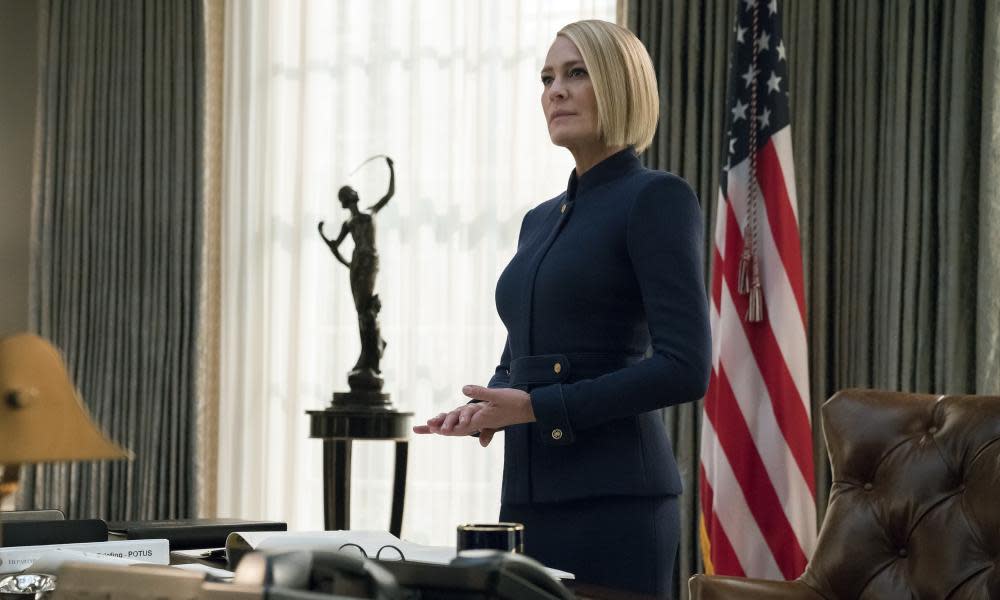House of Cards: season six review – we still need to talk about Kevin

At the end of House of Cards’ fifth run, Frank Underwood was almost dead. His wife Claire had replaced him in the Oval Office and was no longer taking his calls. Fans who had hung on through the increasingly silly years that followed Frank lying and murdering his way to the presidency, after which the show lost its fundamental reason to exist and resorted to empty excess, wondered if Netflix’s political potboiler was about to rise out of its self-parodic rut and refocus.
Now, though, Frank really is gone. He’s been unceremoniously killed off before this sixth and final season begins, thanks to the private disgraces of Kevin Spacey, the man who played him. With Robin Wright as the sole star, it’s a chance not just to refocus, but to reboot.
We rejoin Claire 100 days into her reign. She is already on the brink. Bill and Annette Shepherd (Greg Kinnear and Diane Lane), billionaire siblings in the Koch/Mercer mould, are incensed that Claire’s not as corrupt as her husband. The wider world, meanwhile, is angry with her simply for daring to be a powerful woman, as demonstrated by an arresting opening scene in which an aide reluctantly reads out that day’s most imaginative gendered death threats.
Who will win? The twin modern evils of ingrained misogyny and a super-rich 0.1% who cannot tolerate any dent in their privilege? Or Claire, cool, battle-scarred and quietly ruthless? (Let us not forget that she once poisoned her lover, then rode him one last time while she waited for him to die.)
The circumstances behind Spacey’s departure predispose us to not care that he’s absent, but it’s impossible not to miss his gnashing campery, as season six’s attempt to be more measured and sophisticated comes off as monotonous. Wright is so majestically dignified she’s inert, reacting impassively to blackmail and treachery, and only rarely turning to the camera for wall-breaking asides that, when they do arrive, are platitudes by writers who don’t know exactly who their new main character is.
Claire’s biding her time of course, but biding it with her is a slog, made worse by flabby story structure. Themes, plotlines and characters drift in and abruptly drop out as the show gets bogged down in re-litigating old Frank-related storylines. His former fixer, Doug (Michael Kelly), who clanks around lugubriously like the ghost of seasons past, is one of several indistinguishably peeved men who would, had the writers wielded their new broom with more conviction, have been swept away. Scene after scene is a muted, misfiring two-hander in which someone or other, straining stiffly for an epigram with every line, elliptically threatens someone else. That it’s only an eight-episode season implies pithiness, but, if you edited out the stagnant pauses and impotent staring matches, it would shrivel to five and a half.
Even the sex and murder is limp. There’s a mysterious death of a major-ish character and some illicit boffing, but nobody’s relishing the transgression in the way Frank would. Season six is a web with no spider at the centre.
There are frustrating glimpses of a searing, fresh drama, driven by its women. While Kinnear tries to be an eerily banal antagonist and ends up just being banal, Lane is in brittle Dynasty-villainess mode and is intermittently terrific, particularly when she and Wright face off. Annette and Claire were mates at school, but since then they’ve diverged, in the sense that one of them knows she’s given in to the dark side while the other, as befits the president of the United States, maintains a pretence that she hasn’t. But Spacey looms over Lane and Wright’s best scene together, when Annette tries to humiliate Claire by revealing how they’d shared Frank.
It’s still about him. House of Cards is free of the man who had become a toxic presence, but the awful truth is that without him, it’s weak.

 Yahoo News
Yahoo News 
